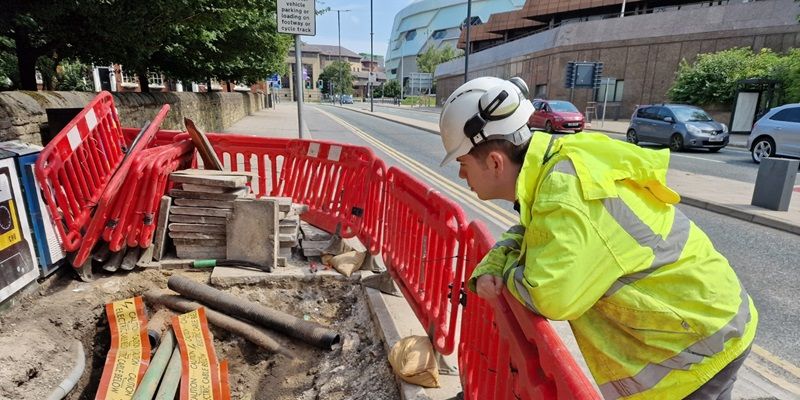An engineering degree apprenticeship at the University of Leeds is proving a valuable route to addressing an urgent skill shortage nationwide.
Alex Sunderland knew that undertaking an engineering degree apprenticeship would prove a worthwhile commitment when he signed on as the first participant.
Geotechnical engineers are civic engineers who analyse soil, rock and groundwater and they are crucial in ensuring the safety of construction projects. Alex, 28, has spent six years working for Leeds City Council, undertaking numerous site visits and site investigations, looking at such issues as mining, contamination, flood risk and locating underground utilities for proposed developments.
Alex said: “I wanted to get to a higher level in my career and achieve chartership status because qualified engineers are sought after. I looked at the various options and decided to apply for an MSc apprenticeship because it was fully funded and I could learn at the same time as working.”
The University of Leeds course involved two days a week at university during usual term-time (2-day release) rather than a block release.
“I have now finished my first year,” said Alex. “The course is a mixture of exams and course work so there are periods of intensity which is a challenge at times.
“In terms of content, I have learned a lot. I had prior skills and experience and the course has augmented my technical and academic knowledge.
“The University has been very supportive and when I have contacted my apprenticeship leader, he has always got back to me quickly. The University has listened to my concerns and changed the programme accordingly.
“I am much better at organising my time and at analysing information and writing reports since I did this course. I am now an in-depth user of Excel which has been useful in my critical analysis of data.”

Alex’s manager is Tom Roebuck who is Group Geotechnical Engineer at Leeds City Council. He said: “There is a shortage of geotechnical engineers so this is a valuable way of skilling up our team.
“More work is required from the employer than was realised, but ultimately it is worth it. We need skilled engineers and this is probably the most flexible way of achieving that goal. This is a good opportunity to train people up and you need to invest three or four years into doing that.
“We are committed to helping our employees develop and we want to bring that academic knowledge into the team. We want to widen the services that we offer as we also do consultative work for other local authorities.
“Geoscience is a broad field covering very disparate subjects such as highways, structures including supportive walls, subsidence and legal matters. We need more technical knowledge in the department and so the knowledge Alex acquires comes in useful.
“It has not been without its challenges as we have to balance keeping projects on track with Alex’s studying, but it is a good investment in the long term.”